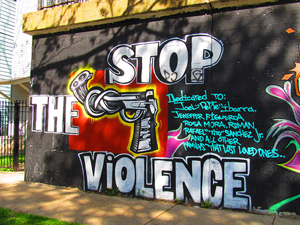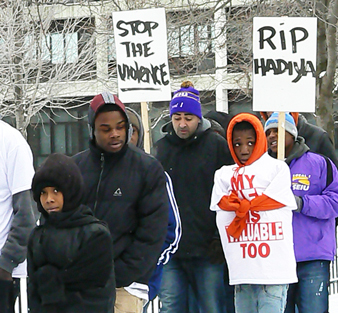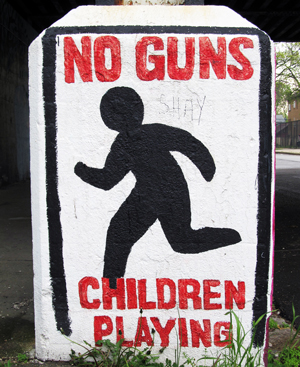-Contributing Writer-

CHICAGO (FinalCall.com) – Terrell Starr has traveled to Africa, lived abroad in Eastern Europe, speaks Russian and Georgian, has earned a master’s degree in Russian, East European and Eurasian Studies and a second master’s degree in journalism, and he’s a proud HBCU (historically Black college and university) graduate.
No one would guess that he grew up in a Detroit home where at 12-years-old he was given a .357 Magnum by his grandmother.
“At a very young age, I was primed to shoot someone,” said Mr. Starr, 32, who currently lives in New York as a news gatherer and reporter. But at 12-years-old Starr was a good student, played sports and stayed away from gangs. His grandmother didn’t want him to become a victim and wanted to make sure he could defend himself and the family “I wasn’t a violent person, but it was the environment I was in.”
Like many across the country, Mr. Starr was moved by the death of Hadiya Pendleton, a 15-year-old girl who died in a park about a mile from President Barack Obama’s Chicago home Jan. 29. The youth, who appeared in an anti-gang PSA about three-years-ago and who just performed in D.C. at President Obama’s inauguration has captured the attention of the country as a recent innocent victim of erratic, senseless gun violence.

“More and more people feel like they need a gun. The dynamics in Chicago are the same as Detroit. It hurts when I see a young person shooting someone. One crucial decision made by parents or youth itself,” said Mr. Starr.
He mentors in New York. Although he felt fortunate to “escape the ghetto” he desires to help make his community a place where young people can be nurtured. He highlights two things that helped him. One was a decision he made and the other was a decision made by people he looked up to.
He decided he wasn’t going to join a gang and didn’t let them make him. “I choose to be a victim. For about a year, I fought with the local gang,” he recalled.
His route to success was simple. His grandmother and teachers cared for him and believed in him. “Along the way, there were enough people around me that gave me a glimmer of hope. I had people at school and a grandmother at home that believed in me. I just had to take care of the in between (school and home),” said Mr. Starr, who understands the importance of uplifting people instead of putting them down. “Today, I am very careful about what I say to a young person.”
“Ultimately, it’s up to us. We have all the resources we need to teach people how to make better decisions,” he explained.
Dearren Martin is a 33-year-old Chicago State University student studying to be a teacher to make a difference. He grew up in Jeffrey Manor and now lives in Princeton Park, both are areas where youth violence and the problems that give birth to it are common. He works with Ronald “Kweisi” Harris, director for the African-American Male Resource Center at Chicago State University.
Like Mr. Starr, Mr. Martin credits a parent that believed in him. “I had a positive mother who was there for me. Our neighbor was a drug dealer and I saw a raid next door,” he said. But the drug dealer refused to even let young Dearren consider joining the gang because the dealer had respect for Mr. Martin’s mother. “Because he respected my mom, he told me, I’d have to deal with him if I ever joined the gang.”

Mr. Martin sees lack of respect for elders and the loss of the village mentality. “Also, we need more men in the school system,” he said.
“Any approach to violence must be comprehensive in nature and address the condition of youth, the condition of parental involvement and positive parenting and the overall condition of the community,” said Khaleelah Muhammad, who manages a project for the Auburn Gresham Community called the Neighborhood Recovery Initiative.
NRI has a parent training component, a youth civic engagement/employment component, a youth reentry program and formerly, a school-based counseling program where the youth in targeted area schools would receive trauma counseling, as well as grief coping and anger (and emotion regulation) management training. This program is in 23 Chicagoland communities and has been quite effective, say supporters.
Ladon Thames Brumfield is the leader of Girls Rule! a goal driven organization whose mission is to empower and aid in the self-development of young girls, ages 7—14 living in urban communities. “Everybody can do something,” she said. “With minimum support, love and engagement,” the group has seen both behavior and grades improve by those youth in the program, she said.
Azariyah is a 14-year-old who has been involved with Girls Rule! for several years. “It’s really sad. Some of my friends knew Hadiya. It could have been anybody. It’s really bad, but I feel like it’s not necessarily all the kid’s fault. It’s the parents who aren’t there for them.”
Miora, another member of Girls Rule! said, “It’s sad that young people are shooting other young people. They are dying so young.” Miora believes having a space where young people can express themselves, their feelings, thoughts and opinions is very helpful. “You learn how to better communicate and get social skills.”
“It really does help if you have something to look forward to instead of going home and doing nothing. It gives them a reason to not go out in the streets,” said Miora.
Both Azariyah and Miora believe the solution is more mentoring programs. “You have to reach the boys that gangbang which has a lot to do with the teen violence. They need mentoring programs.”
(Toure Muhammad is also publisher of Bean Soup Times, read more at http://www.beansouptimes.com.)
Related news:
Loss of promising Black teen renews questions about continued problems of urban violence (FCN, 02-05-2013)












